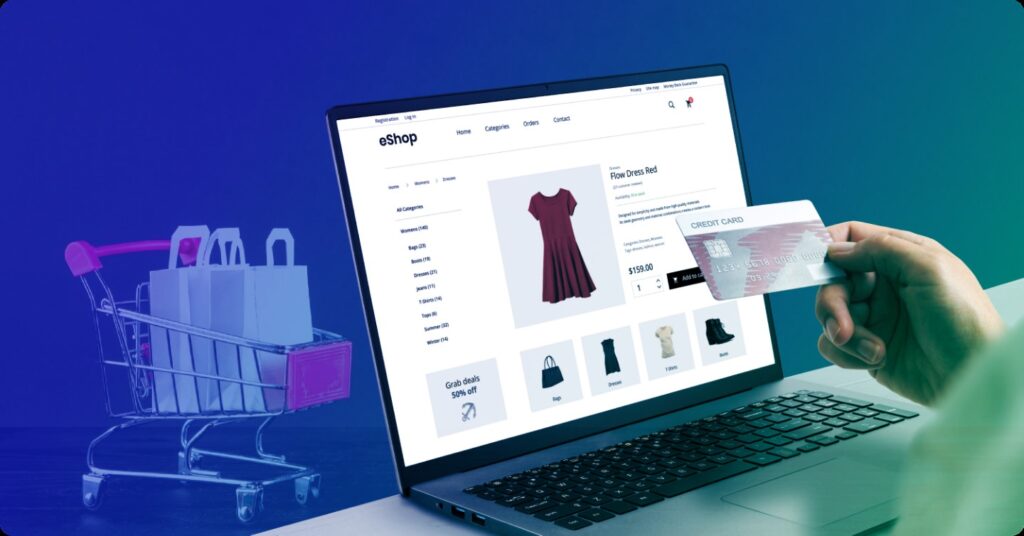
How to Get An E-commerce License in Dubai
Table of Contents
Related Articles


Bank Account Opening for Russian Nationality in UAE

Why External Audits Matter for Free Zone Businesses

Let's Talk
Sign Up For Free Consultation
Dubai has established itself as a global hub for entrepreneurs, attracting businesses from across the world. The city continues to develop policies that support the growth of various industries, and one sector that has seen significant expansion, especially since the COVID-19 pandemic, is e-commerce. If you’re planning to set up an e-commerce business in Dubai UAE, obtaining the appropriate license is a crucial first step. This E-Commerce License in Dubai – UAE not only enables you to sell products through your own website but also allows you to operate on major platforms like Amazon and AliExpress.

In this guide, we’ll walk you through the entire process of obtaining an e-commerce license in Dubai. From understanding the costs involved to gathering the necessary documentation and more, we’ll provide you with all the information you need to kickstart your online business in one of the world’s most dynamic cities.
What is E-commerce?

E-commerce, or electronic commerce, refers to the buying and selling of goods and services over the Internet. It involves transactions that are conducted online, allowing businesses and consumers to exchange products, services, and information without the need for physical interaction. E-commerce encompasses a wide range of activities, including online retail (B2C), business-to-business (B2B) transactions, consumer-to-consumer (C2C) sales, and even mobile commerce (m-commerce).
With the rise of digital platforms, e-commerce has become a vital part of the global economy, offering convenience, accessibility, and a broader market reach for both businesses and consumers.
What is an E-commerce License?

An e-commerce license is a legal permit that allows businesses to operate and conduct commercial activities online. It authorizes companies to sell products or services via digital platforms, including their own websites or through online marketplaces like Amazon, eBay, or AliExpress.
In regions like Dubai, obtaining an e-commerce license is a regulatory requirement for starting an online business. It ensures that the business complies with local laws and regulations, protects consumer rights, and promotes fair trade practices. This license typically includes provisions related to taxation, data protection, and online payment systems, ensuring the business operates legally in the digital marketplace.
Why Do E-commerce Businesses Need to Get a License in Dubai?
Obtaining an e-commerce license in Dubai is essential for establishing a legitimate, credible, and thriving online business in one of the world’s leading commercial hubs. It is important for the following reasons:
- Legal Compliance: A license ensures that your business operates within the legal framework set by Dubai’s regulatory authorities. Without it, your business could face penalties, fines, or even closure.
- Consumer Trust: Having an e-commerce license builds credibility and trust with customers. It shows that your business is legitimate and adheres to local regulations, which can be crucial in attracting and retaining customers in a competitive market.
- Access to Banking and Payment Systems: An e-commerce license is often required to open a corporate bank account, enabling you to process payments securely and efficiently. It also allows you to integrate reliable online payment gateways, ensuring smooth transactions for your customers.
- Market Access and Growth: With an official license, you can expand your operations across various online platforms and marketplaces, both locally and internationally. It also gives you the legal flexibility to market and advertise your products and services.
- Tax and Customs Benefits: Dubai offers several incentives for licensed e-commerce businesses, including tax benefits and simplified customs procedures. This can help you reduce operational costs and streamline the import and export of goods.
- Protection of Intellectual Property: Licensing your e-commerce business also helps protect your intellectual property, such as trademarks and brand names, ensuring that your business assets are safeguarded from potential infringement.
Documents Required to Get an E-commerce License in Dubai

To obtain an e-commerce license in Dubai, you’ll need to prepare and submit several essential documents. These documents ensure that your business complies with the local regulations and that your application is processed smoothly. The required documents typically include:
- Completed Application Form: A filled-out application form for the e-commerce license, which you can obtain from the relevant licensing authority, such as the Dubai Department of Economic Development (DED) or a Free Zone Authority.
- Passport Copies: Copies of the passports of the business owner(s) and any partners or shareholders involved in the company.
- Passport-Sized Photos: Recent passport-sized photographs of the business owners and partners, typically in white background format.
- Proof of Residency: A copy of your UAE residence visa or entry stamp, if applicable. If you are applying as a foreigner without a UAE visa, this may not be required.
- No Objection Certificate (NOC): If you are already employed in the UAE, you might need an NOC from your current employer, stating that they have no objections to you starting your own business.
- Memorandum of Association (MOA): A legal document outlining the company’s structure, including the distribution of shares, roles, and responsibilities of partners or shareholders. This document is necessary if you are establishing a Limited Liability Company (LLC).
- Proof of Address: Evidence of your business location, which could be a rental agreement or a lease contract, depending on whether your business operates from a physical office or a virtual space.
- Business Plan: A comprehensive business plan detailing your e-commerce business model, target market, and financial projections, which may be required by some Free Zones.
- Initial Approval Certificate: In some cases, you might need to obtain an initial approval certificate from the relevant authorities before submitting the full application.
- Trade Name Reservation Certificate: This document confirms that your chosen business name is unique and has been reserved for your use.
- Payment Receipt: Proof of payment for the application fees, license fees, and any other associated costs.
- Steps to Get an E-commerce License
Steps to Get an E-commerce License

To obtain an e-commerce license in Dubai, you must follow a structured process that ensures your business complies with local regulations. Here’s a step-by-step guide to get an e-commerce license in Dubai:
1. Choose Your Business Jurisdiction
Decide whether you want to establish your e-commerce business in a Free Zone or on the Mainland. Free Zones offer benefits like 100% foreign ownership, but may restrict operations outside the zone. Mainland businesses allow you to operate throughout Dubai and the UAE, but you may need a local sponsor who holds 51% ownership.
2. Select and Reserve a Trade Name
Choose a trade name that complies with UAE naming conventions and ensure it is unique. Reserve it with the Department of Economic Development (DED) for Mainland businesses or the relevant Free Zone authority for Free Zone companies.
3. Apply for Initial Approval
Submit your application for initial approval to the DED or Free Zone authority. This approval confirms that your business activities are permissible and allows you to proceed with the registration process.
4. Prepare and Submit Required Documentation
Collect and submit the necessary documents, which typically include:
- Passport copies of the owner(s)
- Trade name certificate
- No Objection Certificate (NOC) if you’re already employed in the UAE
- Initial approval certificate
- Memorandum of Association (MOA) for partnerships
- Office lease agreement (Ejari)
5. Secure Office Space
Even e-commerce businesses in Dubai are required to have a physical office. This can be a shared workspace or a leased office, depending on your business needs. Obtain the Ejari certificate, which serves as proof of your office lease.
6. Obtain Your Final License
Once all documentation is in place, submit everything to the licensing authority (DED or Free Zone) and pay the necessary fees. You’ll then receive your e-commerce license, officially allowing you to operate.
7. Apply for Visas
After obtaining your e-commerce license, you can apply for visas for yourself, your employees, and your dependents. The visa process typically involves:
- Entry Permit: For those entering the UAE for the first time.
- Medical Examination: To meet the health requirements for residency.
- Emirates ID Application: Required for residency and other official purposes.
- Visa Stamping: Final step, where your visa is stamped on your passport.
8. Open a Corporate Bank Account
With your e-commerce license in hand, the next step is to open a corporate bank account. You’ll need to provide the following documents:
- Trade license
- Shareholder(s) passport copies
- Memorandum of Association (MOA)
- Proof of residency (for UAE residents)
- Initial deposit, depending on the bank’s requirements
Opening a bank account is essential for managing your business finances, accepting payments, and ensuring smooth financial operations.
Which Free Zones Offer an E-commerce Licence in Dubai, UAE?

In Dubai, several Free Zones offer e-commerce licenses, catering to various business needs. Here are some notable ones:
- Dubai Silicon Oasis (DSO): Known for its focus on technology and innovation, DSO offers an e-commerce license with modern facilities and infrastructure.
- Dubai Multi Commodities Centre (DMCC): DMCC provides an e-commerce license with a range of business services and a strategic location.
- Dubai Internet City (DIC): DIC, a hub for tech and digital businesses, offers e-commerce licenses with access to a robust IT infrastructure.
- Dubai South: This Free Zone supports e-commerce businesses with its integrated logistics and transport facilities.
- Jebel Ali Free Zone (JAFZA): JAFZA offers e-commerce licenses and is known for its extensive facilities and global trade connections.
- Ajman Free Zone: Located in the northern emirate, Ajman Free Zone offers cost-effective e-commerce licenses with various business support services.
Each of these Free Zones provides unique benefits, so choosing the right one will depend on your specific business needs and objectives.
Ecommerce License Cost in Dubai
The cost of an e-commerce license in Dubai varies based on the Free Zone and specific business needs. Generally, you can expect to pay between AED 6,500 and AED 10,000. This range depends on factors such as the type of business, business model, size, and structure.
Additional costs may include:
- Resident Visas: Fees for employee and owner visas.
- Office Space: Costs for physical or virtual office facilities.
- Registration Fees: Charges by the Free Zone authority for processing and administration.
For the most accurate and personalized quote, it’s best to consult with the a business setup consultant like Tulpar Global Taxation to provide you with detailed information based on your specific requirements.
Top E-commerce Sites in Dubai, UAE
Dubai boasts a thriving e-commerce market with several prominent platforms. Here are some of the top e-commerce sites in Dubai, UAE:
- Amazon: Following its acquisition of Souq.com, Amazon has become a major e-commerce platform in Dubai, offering a wide range of products from electronics to fashion.
- Souq.com: Now part of Amazon, Souq.com is a leading online retailer offering a wide range of products, from electronics to fashion.
- Namshi: Specializing in fashion and lifestyle products, Namshi is popular for its extensive collection of clothing, accessories, and beauty products.
- Carrefour UAE: The online store for Carrefour provides groceries, electronics, and household items, offering convenience and variety.
- Mumzworld: Focused on products for mothers, babies, and children, Mumzworld is a go-to site for parenting essentials and children’s items.
- Sharaf DG: Known for electronics and home appliances, Sharaf DG offers a broad selection of tech products and gadgets.
- Jumbo Electronics: A major player in the electronics sector, Jumbo Electronics provides a range of tech products, including smartphones, laptops, and appliances.
- Ounass: A luxury e-commerce site offering high-end fashion, jewelry, and beauty products, catering to premium shoppers.
- Noon: An extensive online marketplace offering a diverse range of products including electronics, fashion, and groceries, Noon is a key player in the UAE e-commerce landscape.
These platforms reflect the diverse and dynamic e-commerce environment in Dubai, catering to various shopping needs and preferences.
How Can Tulpar Help you Get Ecommerce License in Dubai

Obtaining an e-commerce license is essential for selling products or services online in Dubai. While the process is designed to be straightforward, there are many technicalities and legal requirements that can complicate matters. A single mistake could lead to application rejection, making professional assistance highly recommended.
At Tulpar Global Taxation, we specialize in guiding you through every step of obtaining your e-commerce license, ensuring compliance and minimizing the risk of errors. With our expertise and streamlined approach, we make the process smooth and hassle-free. If you’re ready to establish your e-commerce presence in Dubai, contact Tulpar Global Taxation for expert support and personalized solutions.
Contact Us:
- Website: www.tulpartax.com
- Email: info@tulpartax.com
- Phone: +971-54 444 5124